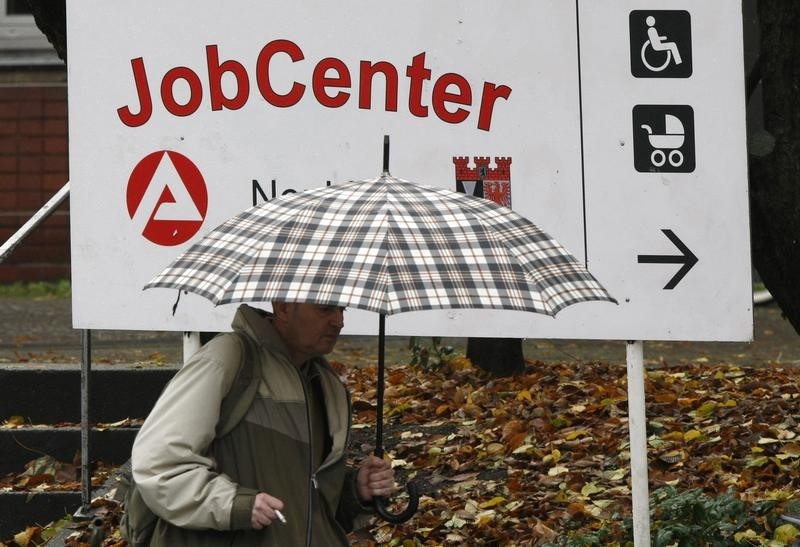By Paul Carrel
BERLIN (Reuters) - German unemployment was unchanged in March, ending a five-month run of falls, and weaker retail sales at the start of the year pointed to a slowdown in private consumption on which the economy is increasingly relying for growth.
Unemployment, adjusted for seasonal swings, was steady at 2.728 million, the Labour Office said, bucking expectations in a Reuters poll of economists for a drop of 7,000. It was the first month since last September the jobless total has not fallen.
DZ Bank economist Michael Holstein said Germany could no longer expect routine falls in unemployment. A mild winter had supported employment in the construction sector, while many of the migrants flooding into Germany would struggle to find work.
"As a result, the trend of steadily falling unemployment numbers is likely over," he said.
In March, the unemployment rate held steady at 6.2 percent, remaining at a post-reunification low.
The prospect of a less rosy labour market is a risk to the outlook for Germany's domestic growth, which has been playing an increasingly important role in driving an expansion in Europe's largest economy as its traditional export motor fades.
"Not all is well in the German labour market", said Holger Schmieding at Berenberg bank, adding that the number of migrants looking for work looked set to rise significantly from mid-2016.
"As the labour force rises, unemployment will probably edge up modestly," he added.
In another setback for private consumption, German retail sales fell in February and January's reading was revised down to show a slight decline for the month.
The volatile indicator, which is often subject to revision, showed a month-on-month decline of 0.4 percent, the Federal Statistics Office said on Thursday. Economists polled by Reuters had expected a monthly increase of 0.3 percent.
German business morale rose in March, but experts warned that uncertainty was clouding the outlook.
Last year, the German economy grew by 1.7 percent and Klaus Wohlrabe, economist a the Ifo economic institute, said last week growth this year would probably not surpass that pace.
In a sign that weak foreign demand from China and other emerging markets held back growth at the start of 2016, German exports dropped for the second consecutive month in January while imports jumped more than expected.
Joerg Zeuner, economist at German state development bank KfW, said worries about Britain's June 23 vote on EU membership, the outlook for China and the low oil price were concerns for Germany's foreign trading industries.
